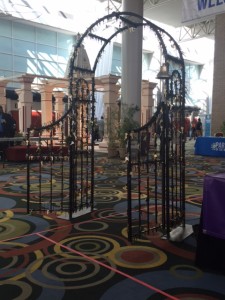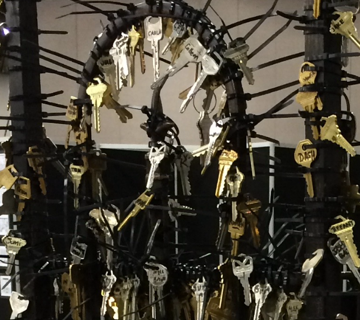The following was presented by OW Long-term Planning Chair Lorie Winder Stromberg as part of a panel discussion about the Ordain Women “Keys” art installation at the Parliament of the World’s Religions on Monday, October 19, 2015.
“The year we all turned twelve,” writes Mormon memoirist Joanna Brooks, “the boys in my Sunday School class received the priesthood: the spiritual authority to lead, bless, and baptize, passed from Mormon father to Mormon son, by the laying on of hands.
That’s what Chuckie, Mike, and Brian got for their twelfth birthdays.
I got The Marie Osmond Guide to Beauty, Health & Style.”
Priesthood in Mormonism is the power of God given to all men to perform Church ordinances, lead Mormon congregations, offer blessings of healing and comfort, and preside over Mormon homes. This democratization of religious authority is laudable, and the belief that God’s power is to be shared rather than hoarded or held by an elite clergy remains one of the most compelling doctrines of Mormonism. However, there’s one slight hitch–women are not ordained to the lay priesthood available to men. This means all men in the LDS Church have a spiritual and operational authority that women do not. Because institutional power in the Church is tied to priesthood office, women, though allowed to speak, teach and pray in church meetings, are excluded from nearly every position of clerical, fiscal, ritual, and ultimate decision-making authority. As many Mormon women have observed, their adolescent sons have more substantive authority than they do. Even women’s significant work within Church auxiliaries is just that—auxiliary—and subject to the direction of male priesthood leaders. This pattern persists in Mormon homes. Despite encouraging full partnership between husbands and wives, the Church’s Proclamation on the Family insists that men still preside. This probably sounds achingly familiar to many of my Southern Baptist and Evangelical sisters, as would the separate-but-equal, complementarian rhetoric employed by Mormons that uses motherhood to circumscribe women’s lives and was used more generally in the past to deny woman access to the voting booth, political office, education, employment and, even still, spiritual authority in our faith communities.
The full extent of the Mormon Church’s gender-exclusive priesthood policy is summed up succinctly in the following statement by Elder Bruce C. Hafen, a Mormon Church leader and former dean of the J. Reuben Clark School of Law at Brigham Young University: “The one category of blessing in which the role of women is not the same as that of men holding the priesthood is that of administering the gospel and governing all things.” A mere trifle.
We refuse to tolerate discrimination against women in our secular institutions. Why do we so readily accept it in our religious communities?
In her poem, Pope Francis in Rio, Alla Renee Bozarth writes:
Quiero lío …
he says.
He says it
quite clearly.
In front of more
than a million people
he says it.
In the city named River,
the pope says what is
loosely translated as,
I want you to make a mess,
or in the street vernacular,
I want you to screw up ~
but what he really said is
those two words,
literally the poetic,
the romantic word for
I desire, and the cracking
concrete word, trouble
There was no menace
or challenge in his words.
They were lovingly spoken.
He meant what he said
in a way suffused with hope
and faith in the listeners
as well as in the living flames
and rushing waters of Holy Spirit.
The good papa,
the hugging papa,
the twinkling, chuckling,
good-natured, humble
man who refuses
the pope’s crown,
the false trimmings,
the scandalous trappings—
he says he wants us
to make trouble . . .
Us?
To whom was he speaking?
The youth? The smart and restless?
Was he saying it to everyone?
Old, young, male, female?
That’s us, Sisters.
Let’s be our holy best
and blessed selves
and show what we
can do.
Quiero lío, he says?
Let’s give it to him.
“Sometimes,” Bozarth also writes, “we have to ‘raise hell, for heaven’s sake.’”
In the Mormon faith, former Church President Gordon B. Hinckley, when asked by a reporter if the policy excluding women from priesthood ordination could be changed, said, “Yes. But there’s no agitation for that.” Though not exactly what either church leader had in mind, we at Ordain Women are responding to President Hinckley’s challenge, just as our Roman Catholic sisters at the Women’s Ordination Conference are answering Pope Francis’s call, “Quiero lío …”
Like many here, I have faith in the ability of religion to liberate, rather than subjugate, women. Which shall we choose?
We at Ordain Women assert that the fundamental tenets of The Church of Jesus Christ of Latter-day Saints support gender equality, including the ordination of women. Indeed, in Mormonism, spiritual empowerment is the sum of God’s hope for us as men and women. Further, if priesthood is ultimately about love and service, we ask, why not empower all to use it? Some accuse women of being power-hungry if they advocate for women’s full inclusion in their faith traditions, treating God’s power as if it were in short supply. What they fail to acknowledge is that there is no shame, nor are there accusations of improper ambition, attached to men who aspire to ordination, pastoral leadership, the opportunity to preach and lead others in prayer, or stand, pray and read sacred texts in holy places. Neither should there be for women.
It is true that power in institutions, including churches, can be wielded coercively and abusively. This is one reason women are leery of power, and Mormon scripture rightly warns about its ability to corrupt. (See Doctrine and Covenants 121:39) However, having power within an institution is preferable to institutional powerlessness, and having power can enable us to do tremendous good, particularly if we use it to serve and empower others.
Why do we women remain in religious institutions that marginalize us? There are many reasons–belief, conviction, the desire to serve, cultural identity, family ties, political and societal influences, to name just a few. The point is, if we care about a just society and recognize that religions significantly impact the broader culture, we all have a stake in whether or not our religious institutions are equitable. And so we have a choice. We can either perpetuate inequality through silence and inaction, or we can faithfully agitate and make holy trouble.
It’s time—past time, really—that we gather as an interfaith community to state, unequivocally, equality shouldn’t stop at the doors of our churches, shrines, synagogues and mosques.
In Mormonism, as in many religious traditions, keys represent access and carry with them significant ecclesiastical and administrative authority. Accordingly, Ordain Women has created “Keys,” an interactive initiative to call attention to the need for women to have full access to ecclesiastical power and the ability to serve within their faith communities. Designed in collaboration with artist Ginny Huo, “Keys” is an on-going public art project where all can register their support for religious gender equality. The keys we invite you to attach today—and that others can continue to attach—embody this belief.







